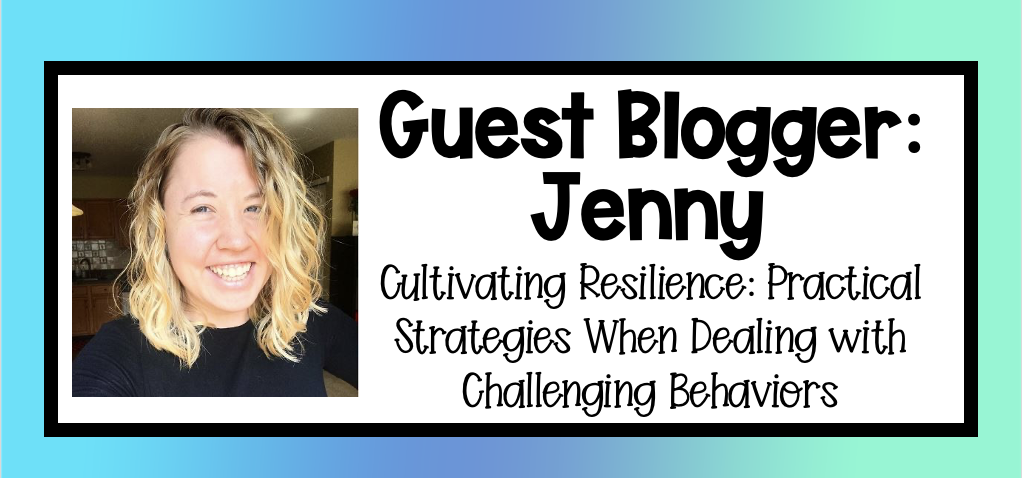I am so excited to introduce this week’s guest blogger – Jenny from Little Learners Big Feelings to talk all about how to Cultivate Resilience and Practical Strategies When Dealing with Challenging Behaviors!

As a teacher of emotional support students, I encounter challenging behaviors almost daily. I’m not talking your run-of-the-mill name calling at recess or calling out in class (although that certainly happens too!). I’m referring to the “big behaviors” – eloping, physical aggression, verbal aggression, and other behaviors that can be really scary, really frustrating, really overwhelming, and just plain hard. And people always ask me – how do you not take it personally? And I respond with, Great question. It’s called cultivate resilience.
Unless you’re also a behavior special education teacher too, chances are these behaviors I’m describing would not be a daily occurrence for you. When getting really real about the behaviors in my classroom, I tell others, “I tell you this to prepare you, not to scare you.” Because here’s the truth – whether the behaviors you’re dealing with are low-level or intense, you can be prepared for whatever challenging behaviors come your way! The secret is to cultivate resilience.
Let me tell you, behavior special education has been trial by fire in cultivating my resilience. However, I have learned some important lessons along the way that I hope will encourage you – practices I and other teachers have implemented to build up our tough skin, protect our own well-being, and prioritize effective behavioral strategies without becoming a martyr for the cause. Here we go…
Don’t wait until a bad day with behaviors in the classroom to take care of yourself. Build healthy routines into your daily life – focusing on routines that keep you grounded and help you relieve stress. Some examples could be a daily exercise habit, nourishing yourself with whole foods regularly, and having hobbies that you enjoy. Manage your stress before your stress manages you! You are the one to cultivate resilience.
Challenging behavior can be incredibly isolating. So go find your teacher bestie or make a #teachergram account, because you were never meant to do this alone! Always respect confidentiality, of course, and be careful to not feed into the rumor mill or the complaining cycle. However, having a friend to comfort you after a hard time can make a world of difference. Whether it’s a healthy vent session or a good old-fashion distraction, friends and family can be the glue that holds you together in these times. You are the one to cultivate resilience.
I am not talking about that toxic positivity “nothing is ever bad” junk. No, no, no! Find ways to acknowledge the struggle of challenging behaviors without dwelling on the negativity. Perhaps creating a list of positive affirmations or starting a gratitude journal can help you refocus on the good that is happening in your classroom and your teaching practice, despite the challenges you face. For example, I have a sticky note on my desk that says, “I am confident. I am capable. I can and will succeed. My students’ behaviors do not define me!” You are the one to cultivate resilience.
Boundaries is a hot topic among educators, and for good reason – it is so dang important! External boundaries such as leaving work at a reasonable time, deleting your work email from your phone, and keeping your computer closed on the weekends are a great start. But this also means set firm internal boundaries. Recognize when you need to “tap out” and ask others for a break. Listen when your body tells you it needs a mental health day! And please please please, don’t let yourself believe everything your students say; you’re not a monster (or insert other expletives) for holding them to high expectations. You are the one to cultivate resilience.
Whether you have a student who won’t stop picking his nose or a student who won’t stop running into traffic, behavior always comes down to what you can control. You can’t control your students behaviors, only what and how you teach them new skills. But in the mean time, you can cultivate your resilience through proactive routines, a support system, positivity practices, and some good boundaries. It will help you be in the best place to support your students, no matter what they throw at you – literally or figuratively!
You can do this, teacher friend! Go on and cultivate resilience.
Read more about attention and escape behaviors here!
Learn more about how to create a safe space for your students here!
Instagram | TeachersPayTeachers | Facebook | Boom Learning Library
What are you looking for?
COPYRIGHT © 2025 Full SPED Ahead